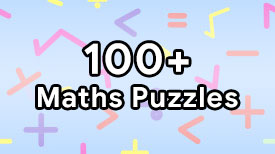Top Math Activities & Games to Fun Anywhere!
Introducing math-oriented activities to children helps them set up for academic success in their school life. Keep in mind that early math skills are one of the best predictors of later success.
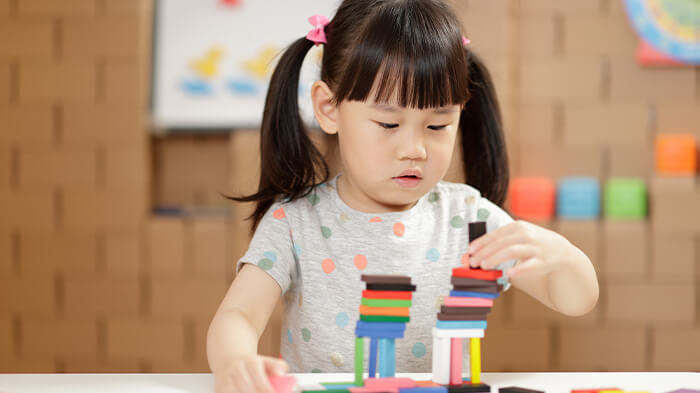
Mathematical thinking can be described as a way of looking at things closely, stripping them down into their bare essentials, and then analyzing their underlying patterns. Questioning, exploring, visualizing, proving, and working systems are all part of mathematical thinking.
These are the skills that children will need if they are to do well in math at school, and playing games can develop them. Math games to play at home and outdoor math activities help kids master number facts, which aids in mathematical development.
Let’s learn the best activity and game alternatives together to develop our kids’ math abilities.
10 Favorite Indoor Math Games to Play at Home
On rainy days, days off school, or during enforced periods of homeschooling due to lockdowns, it can be hard to persuade children to practice their maths, but these math activities are the best fun things to do with kids in no time!
1. MentalUP Math Games
The education system in this 21st Century has changed rapidly. Starting from small kids to elders have turned themselves into the digital world. Online math games are not just fun to play; they can also be a highly effective way to help your child, with a long list of benefits.
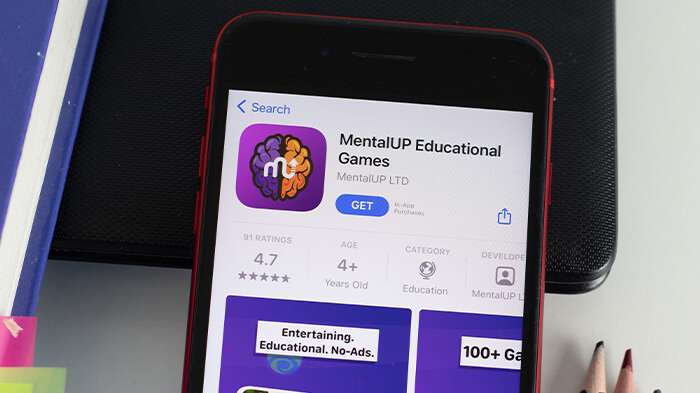
With MentalUP’s online math games that are designed by experts will help your kids to have fun when developing their math skills at the same time. Often, kids are drawn to online games without even realizing that they are learning. So, using online sources such as games or math websites for kids is an effective approach.
You can use MentalUP’s gamified exercises with peace in mind because of the no-ads policy. When they start to play math games regularly, they will understand math isn’t a boring class, and their counting ability will boost on short notice. It is time to play fun games!
Support your children by using everyday math games to play at home by using MentalUP, which is also one of the best geometry apps. Showing kids that math is alive in the world open their eyes to the importance of its basic concepts. 📝
The more they learn how to get better at math easily, and the stronger their skills become, the more excited they feel. MentalUP’s dozens of easy math games to play at home are waiting for you. 🎯
2.Count Down!
This alternative is among easy math fluency games to play at home. It is a simple at-home version of the TV favorite and can be played with any number of players.
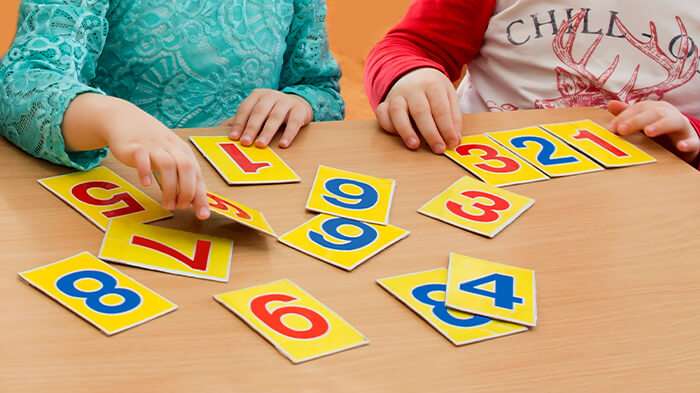
What you need to play:
4 ‘large number’ cards with the numbers 25, 50, 75, and 100 on them.
A set of cards with the digits 1-10 on them, with at least two cards for each number
How to play:
- Set out 4 large number cards (25, 50, 75, and 100) face down and mixed up.
- Do the same with the 1 – 10 cards, making sure you have at least 2 cards for each number.
- Players take it in turns to select one of the big number cards or one of the small number cards until there are 6 cards laid out altogether.
- Someone who is playing the game needs to generate a 3-digit number. This can be by throwing a dice or selecting cards from a pile of 0 to 9 cards.
- Once the number has been generated, turn over the six cards, and players have to try and get to that total using any of the six number cards and any of the four operations.
- Each card can only be used once, and the winner is the first person to reach the total or the player who is closest after a set length of time.
- The game can be adapted for younger children by choosing the numbers on the cards carefully and having them aim to reach a 2-digit number rather than a 3-digit number.
3. Salute
This simple activity is among the coolest math games to play at school and home. This game is all about bringing verbalization and maths together. This way, you can start teaching your kids what is mental math and help them improve by having fun.

What you need to play:
Two willing participants
Cards numbered 1-10 (these can be made from a sheet of paper)
How to play:
- The game starts with the two players facing each other. Each person selects a numbered card and sticks it on their forehead, so the other player can see.
- The person leading the game gives a statement, such as what the sum of the two numbers is, the difference between the two or the product of the two, etc.
- Each player has to work out what number is on their card, based on what is written on the other person’s head and the rule is given.
4. Multiplication Bingo
Bingo is a perennially fun game that can be enjoyed by people of all ages, and this version puts a mathematical twist on the classic game as a way to boost multiplication skills.

What you need to play:
Paper to write numbers down on
How to play:
- In this mathematical version of the game, all players write down 5 numbers, which are multiples of a given times table. For example: if they were doing the 5 times table, they might write 10, 35, 45, 50, and 60.
- A third person can lead the game and call out multiplication questions from the chosen times table, or they can be written on cards, jumbled up in a pile for players to take turns picking and reading out.
- If the player has an answer to the question on their bingo board, they can cross it out. The first person to cross out all their numbers is the winner.
5. Math Problem Scavenger Hunt
All children enjoy a scavenger hunt, so why not make one based on math?

What you need to play:
Some creativity
A garden or home full of measurable objects!
How to play:
- Give children a grid with some pre-set weights and lengths on. It will then be a challenge for them to find something in the garden that is approximately 10cm long or something in the house that weighs 300g, as an example.
- Get your child to gather all of the items they think match the weights and lengths on the card, and check how well they have done with some kitchen scales and a tape measure!
6. Yes/No Game
This is another simple maths game that is loved by children in classrooms all over the world! It’s also a good way to get into the practice of 2D and 3D shapes, which as parents, we can sometimes avoid.

What you need to play:
A series of cards/pieces of paper
How to play:
- Both players put a card on their heads. It could have a number on it, a shape, etc.
- The first player asks a question that can only be answered with ‘yes’ or ‘no’; e.g., ‘Am I odd?’ ‘Am I under 20?’ ‘Do I have 4 sides?’ etc.
- They keep asking questions until they get the answer correct, or they run out of turns. You can set the number of turns they get at the beginning of the game. Then it is time for the other player to have a go.
7. Bang Bang
Bang bang is a great game for practicing quick recall facts. It can be said that this game is one of the best math activities for kids

What you need to play:
Two willing mathematicians!
How to play:
- 2 players stand back to back, cowboy shootout style.
- A question is called out, such as ‘what is 7 x 6?’
- The first player to turn, face their opponent, shout ‘bang bang’ and give the answer wins the round.
- This is then repeated until a number of points, decided at the start of the game, is reached. That player is then the winner.
8. Five to One
This game not only tests children’s verbalization and problem-solving skills, but it also brings an element of competition into doing maths at home, and we all know how much children love to win!

What you need to play:
Cards with maths statements written on them
Two players
How to play:
- The first person picks a card containing five statements. Each of the five statements provides a clue to the final answer.
- Player one picks a card and reads out the first statement. E.g., ‘This shape has four sides.’
- Player two can choose to give an answer and score the maximum five points if they are correct but risk scoring zero if they are wrong.
- Alternatively, they can choose to hear the four-point question. They keep on going until they get a question wrong, or they choose to pass to hear the next question until they get to the final one-point question.
9. 24 Game
This is a very simple game that will help your child practice their arithmetic skills, and it is a game they can play with a group of friends.

What you need to play:
A pack of playing cards (The number cards only)
How to play:
- Each player picks 4 number cards at random from the pile.
- They then need to find a way to manipulate the 4 digits using any of the 4 operations (+, -, x, ÷) so the result is 24. For example, if they chose 4, 7, 8, 8, they could do (7 – (8÷8) x 4 = 24)
- If nobody can reach 24, you can make it the closest win!
10. Five of a Kind
This is one of the most tricky games to play with math flash cards at home that will truly put your child’s maths skills and knowledge to the test.

What you need to play:
5 sets of cards numbered 2-9
How to play:
- The first player picks a card numbered from 2 to 9.
- They then collect another 4 cards with the same number as the first, so they have 5 cards with the same number.
- The game aims to use one or more of the five cards to get an answer for each digit between one and ten. For example, the player chose a 5.
- He or she would then need to use one or more of the cards to find the answers 1, 2, and 3. To make 1, they could do 5 ÷ 5, to make 2 they could do (5 ÷ 5) + (5 ÷ 5), etc.
Kids should have daily experiences with math strategies. There are many opportunities to teach them the basic concepts by solving problems throughout the day or using math quotes for kids to make things more entertaining. 📚
MentalUP can help you in this. Thanks to its entertaining math games, you can develop your kids’ math, problem-solving logic, and counting skills at the same time. 📊
Also, you can always track their status by using its detailed skill analysis reports and choose the most suitable alternatives according to your kids’ needs. 🎮
3 Fun Outdoor Math Activities For Kids
Whether you realize it or not, the great outdoors and math go hand in hand. These outdoor math games and activities should serve as inspiration about how you can help your child learn math while outdoors!
1. Life Size Board Game
Board games are a fun way to spend time with the family, but have you ever thought about actually becoming part of the board game?

To help your child learn math outside, you can easily make a life-size board game and become the characters in the game.
What you need to play:
Paper plates (even just sheets of paper)
A large dice (or a cube-shaped box that can be made into a dice)
A dose of creativity!
How to play:
- Step 1: Use paper plates as an easy way to make the board game squares, and if you don’t have access to large dice, a cube-shaped box can be made into one instead.
- Step 2: The board games you play can vary depending on the age of your child. With younger children, the plates can be numbered to encourage counting or learning their number bonds, whilst older kids could have times tables or other math facts to answer as they go around the board.
2. Multiplication Hopscotch
Everyone knows how to play hopscotch, but by introducing maths into the mix, you can take this traditional playground game to the next level as one of the most amazing math activities for young kids.

What you need to play:
Chalk
How to play:
- Step 1: Using chalk, draw out hopscotch squares on the ground, and in each square, write either multiple a number or multiplication facts.
- Step 2: Each person then hops, skips and counts at the same time, which is a really good way of helping those multiplication tables stick. The other great thing about this game is this can be done with one person, or if friends are visiting, everyone can join in and have a go.
3. Telling Time Activity
Time is one of those things many children find tricky, but this game is one of the best summer math activities for kids and will help your child tackle this topic.

What you need to play:
Chalk
How to play:
- Step 1: Try drawing a clock on the ground with chalk.
- Step 2: Then, get your child to use their body to make the hands of the clock. They could show just the hour or minute hands by lying straight, or they could use their body to make the hour and the minute hands, with their legs being the minute hand and their torso the hour hand.
From a young age, children can build relationships between numbers and represented items. Numbers can be represented with objects, pictures, or games as a way to make the concept more real to young learners. 🎈
You can help your children to love math and understand it easily by using fun math activities for kids. MentalUP provides you with 150+ brain games and 240+ fitness exercises to use for this purpose. 🎉
Why Are Math Activities and Games Important?
- Math games for kids can help them grasp those foundational skills from the beginning so that they have the muscle memory for the development of more advanced skills.
- Counting and learning numbers begin a child’s learning adventure. Very early on, math skills begin to develop, and natural practice takes kids into the world of addition and subtraction.
- Math skills provide a foundation upon which students can build their academic future. Understanding basic math concepts and how to solve math word problems early in their education prepares children to excel as they move into higher grades.
How Can You Teach Basic Math Concepts to Children?
The main point of math activities and games is to help teach children new skills. This is why it’s important to choose alternatives that will give your child a little bit of a challenge.

You can help children to develop critical thinking, creativity, and mathematical skills by providing suitable games. Now let’s learn how you can boost your kids’ basic math skills easily.
Logic
Most people don’t consider the importance of logic when it comes to mathematics, but the world demands this tool for advanced success. Problem-solving and real-time solutions keep us moving into the future, and the sooner kids can strengthen these skills, the better.
Playing games like memory matching and sorting, finding the odd one out, brain puzzles, board games, and mazes can improve mental operations, resulting in enhanced levels of cognitive activity and the ability to solve intellectual difficulties.
Number Sense
Number sense is the first step in math awareness. It describes the basics of learning about numbers, including counting forwards and backward to understand the relationship between numbers. Guessing games are a fun and approachable way to get kids involved with online math classes.
Adding and Subtracting
Adding and subtracting are more advanced skills that should be taught after the introduction of number sense. The basics of addition and subtraction can be introduced through normal daily interactions between children, such as counting blocks or crayons.
This does not only happen at school in the classroom. These opportunities can be initiated as they arise in our daily situations, such as a story in a book, setting the table, putting clothes away, and so forth.
Don’t forget kids respond to learning when engaged, challenged, and enjoying their tasks. There is quite a difference when kids are active participants! Games create a context for developing math skills. ✅
Certified educational app MentalUP includes lots of fun math games that are designed for this purpose. Through these games, your kids can discover ways to apply what they have learned in the classroom. 🎓
Keep in mind that it is possible to have fun while developing important math skills with MentalUP. You will be surprised when you see how your children feel motivated to learn math with gamified exercises. ✨



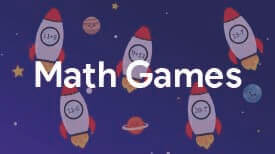

![8 Best Math Apps for Kids [Teacher-Recommended]](https://www.mentalup.co/img/blog/k-img/k-preschool-math-games-and-activities.jpg)
